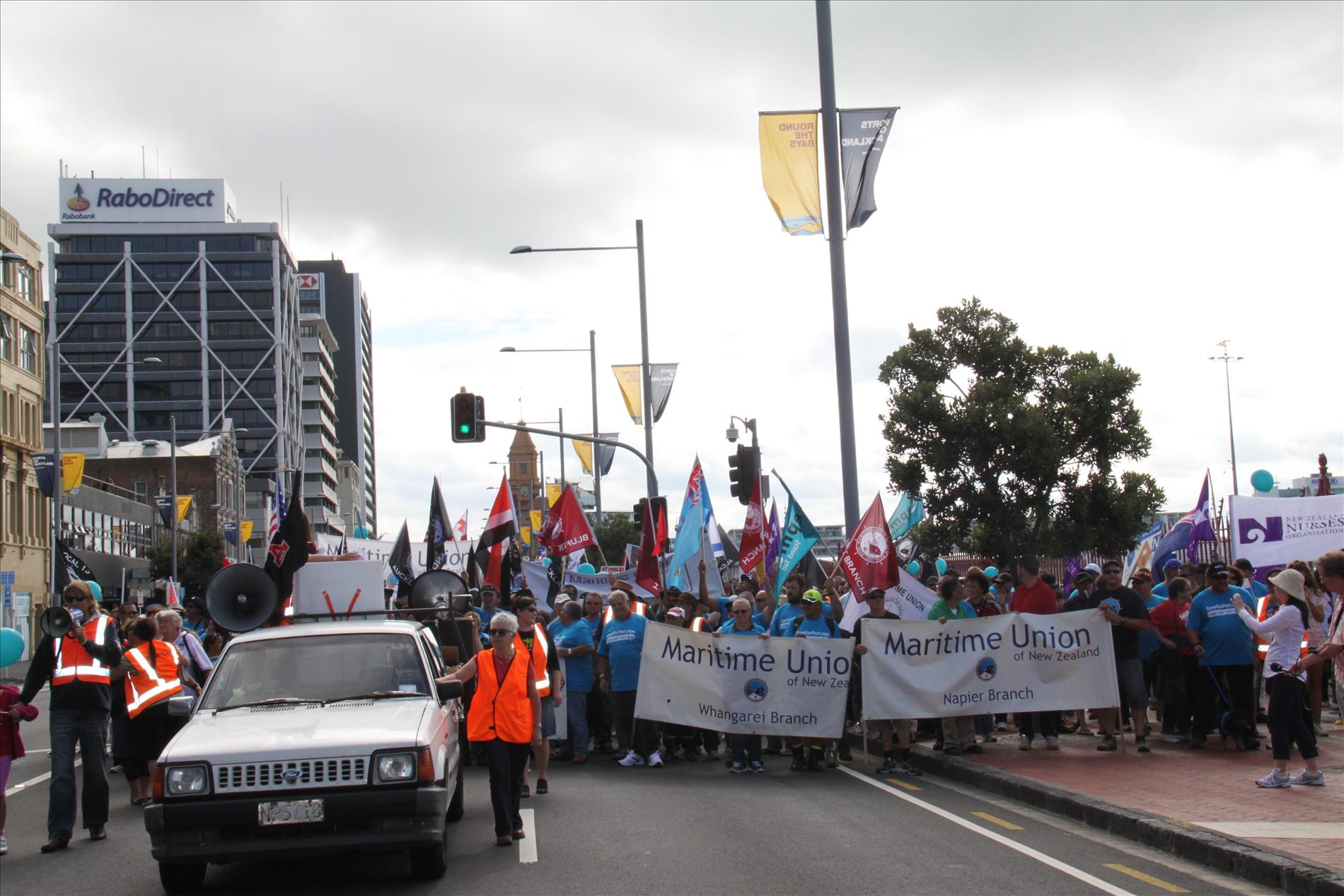 About 5000 Aucklanders marched in protest on March 10, 2012 against the decision of the Ports of Auckland to sack 300 workers and contract out their jobs.
About 5000 Aucklanders marched in protest on March 10, 2012 against the decision of the Ports of Auckland to sack 300 workers and contract out their jobs.
At the same time, dockworkers overseas were refusing to touch ships loaded by non-union labour at the Ports of Auckland.
The ins and outs of the struggle on the waterfront between the Maritime Union and the Ports of Auckland have become the subject of intense public debate but the issue at the heart of the dispute is simple.
Maritime Union President Garry Parsloe described the dispute as job security and family.
“We want a collective employment agreement that covers our members, one with some form of security so that people know when they go to work and when they do not go to work, so that they know what family time they have,” he said.
The port company demanded that the workers should either give up their limited guarantees around hours or have their jobs outsourced, insisting that the port must have total flexibility to become competitive and profitable.
Stalled negotiations
Bargaining for a new collective agreement began in September 2011 but stalled several times. In February 2012, the company called off bargaining and announced its intention to sack its workforce of around 300 workers and employ contractors to do its work.
This resulted in a strike that crippled the port, cost hard-pressed workers several weeks’ wages and inconvenienced Auckland business owners and customers.
The union went to the Employment Court seeking an injunction to stop the contracting-out process on the basis that the company was not bargaining in good faith because it was advertising the jobs of the workers at the same time it was going through the motions of negotiating.
At a settlement conference with the Employment Court on March 21, 2012, the company agreed to halt the contracting process and return to mediating bargaining and the workers agreed to return to work.
Agreement ignored
Just when it appeared workers might be returning to work and the port starting to operate again the port company decided to ignore this agreement and lock the workers out in defiance of the Court and of public expectation of how it should behave.
The port company has spent an enormous amount of public money on advertisements in newspapers in an attempt to convince the public that its workforce is inflexible, overpaid, unproductive and unwilling to move with the times.
The union points out that the current employment agreement already provides considerable flexibility. Only 53% of workers are permanent (and full time) and entitled to 40 hours work day or night. A further 27% are only guaranteed 24 hours a week and the remaining 20 percent are casual and guaranteed no work at all giving the company huge flexibility.
Workers are already rostered on to changing shifts, night and day, any day of the week. Permanent workers only get one guaranteed weekend off in every three weeks. Pay rates for union workers are modest.
Casual workers earn $14.25 an hour and skilled permanent workers $27.26 an hour. There are no penal rates for nights and weekends, service pay or overtime rate.
Questionably claims
Company claims about productivity and profit levels also have to be questioned when it congratulated workers for achieving record hourly container moves just last September and is mid range in terms of its profitability compared with other ports around the world.
The workers are proud of the work they do and have indicated a willingness to continue lifting productivity and performance at the Port.
The dispute has struck a chord with workers all over the world who are facing an insecure future because of the casualisation of jobs by businesses seeking to lower labour costs while increasing profits and the pay of chief executives.
At the rally on March 10, a contingent of 30 dockworkers from the US was present along with unionists from Australia and representatives from the International Transport Unions Federation.
Workers everywhere are beginning to make the connections between casualisation and falling living standards, family stress and less cohesive communities.
They are increasingly questioning the morality and wisdom of this type of employment arrangement and seeking to support each other across national and international boundaries against these oppressive work practices.
This outpouring of support for the wharfies is surely a genuine expression of community concern that a City Council owned business is not conducting itself in a manner that reflects community values.
Bill Bradford is the editor of the Union Express, the newspaper of the FIRST Union.
Photo : March of Solidarity. Port workers go on procession in Auckland on March 10, 2012
Port lifts lockout, workers return

Ports of Auckland has lifted its lockout notice, allowing stevedores back to work to alleviate the city’s “severely affected” supply chain after revealing a rift over strategy in its boardroom had resulted in the resignation of director Rob Campbell.
Chief executive Tony Gibson, who has copped some criticism over his strategy to contract out wharf workers, got the backing of the board for what appears to be a fresh approach, involving returning the unionised workforce to the port as quickly as possible and placing the outsourcing objective “on hold.”
Chairman Richard Pearson, who unions have accused of being “out of control” in the long-running saga, said the board was “fully supportive” of the approach announced on March 30, just under two hours after a statement confirming Campbell’s departure.
Maritime Union members will return to work no later than Good Friday, April 6, and continue to be paid in the interim. The port is also going back into talks with the union to try to get the “changes we need through a new collective.”
The port appears to have bowed to pressure from its owners also, saying in the March 30, 2012 statement that it “has listened to the wishes of the court, as well as the views of the mayor and all other stakeholders.”






